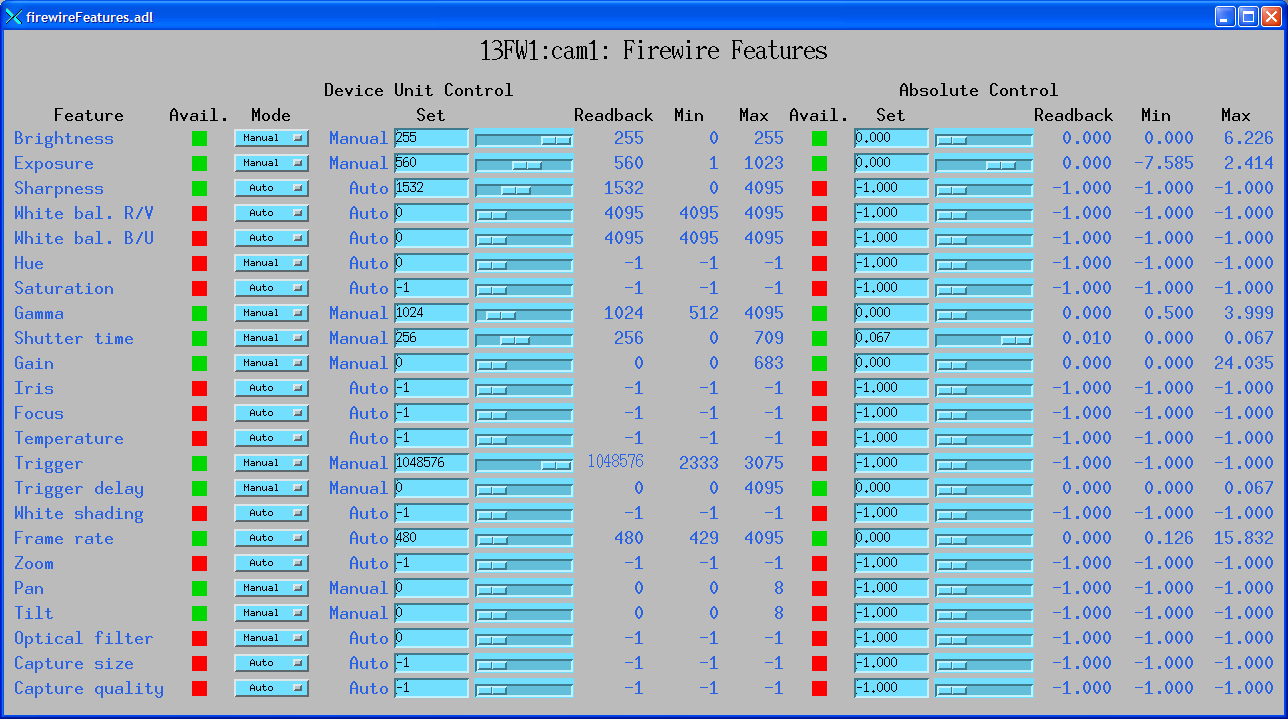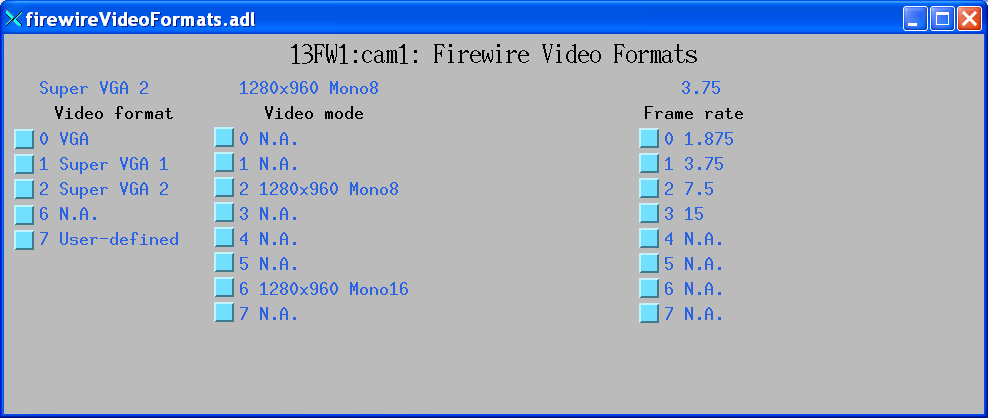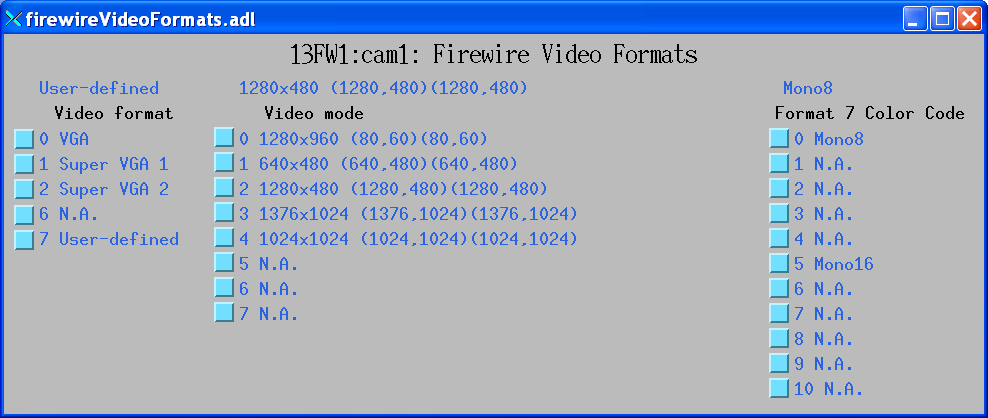FirewireFeatures.adl

This is a driver for Firewire (IEEE 1394) cameras that follow the IIDC/DCAM specification. This industry standard allows a single driver to control cameras from any manufacturer, using any of the supported video formats and features. It inherits from ADDriver and implements many of the parameters in ADStdDriverParams.h. It also implements a number of parameters that are specific to the Firewire cameras.
This driver runs only on Windows. It uses the Carnegie Mellon 1394 camera driver and library. There is also an areaDetector Firewire driver for Linux available from the Diamond Light Source.
The IIDC/DCAM specification defines standard ways that manufacturers must implement features like shutter time, white balance, frame sizes, frame rates, etc. There is a standard way to determine whether or not a particular camera supports a particular feature. If it does then there is a standard way of querying the allowed range of values for that feature. This makes it quite easy to write a driver that can support cameras with any capabilities from any manufacturer.
The DCAM specification defines standard video frame sizes, color modes and frames rates. The following tables lists these standard formats and mode. Video format 7 is special. It allows defining an ROI on the camera to read out. The pixel resolution with which the size and position of this ROI can be defined can be queried, and is not necessarily a single pixel. In Format 7 the frame rate settings do not apply, and the frame rate is determined by the size of the Fireware data packets.
| Standard IIDC/DCAM Video Formats and Video Modes | |||
| Format Number | Format Description | Mode Number | Mode Description |
|---|---|---|---|
| 0 | VGA | ||
| 0 | 160x120 YUV444 | ||
| 1 | 320x240 YUV422 | ||
| 2 | 640x480 YUV411 | ||
| 3 | 640X480 YUV422 | ||
| 4 | 640x480 RGB | ||
| 5 | 640x480 Mono8 | ||
| 6 | 640x480 Mono16 | ||
| 7 | Reserved | ||
| 1 | Super-VGA1 | ||
| 0 | 800x600 YUV422 | ||
| 1 | 800x600 RGB | ||
| 2 | 800x600 Mono8 | ||
| 3 | 1024x768 YUV422 | ||
| 4 | 1024x768 RGB | ||
| 5 | 1024x768 Mono8 | ||
| 6 | 800x600 Mono16 | ||
| 7 | 1024x768 Mono16 | ||
| 2 | Super-VGA2 | ||
| 0 | 1280x960 YUV422 | ||
| 1 | 1280x960 RGB | ||
| 2 | 1280x960 Mono8 | ||
| 3 | 1600x1200 YUV422 | ||
| 4 | 1600x1200 RGB | ||
| 5 | 1600x1200 Mono8 | ||
| 6 | 1280x960 Mono16 | ||
| 7 | 1600x1200 Mono16 | ||
| 3-5 | Reserved | ||
| 0-7 | Reserved | ||
| 6 | Still image | ||
| 0 | Exif | ||
| 1-7 | Reserved | ||
| 7 | Partial Image (user-defineable ROI) | ||
| 0-7 | Vendor-defined | ||
The following tables lists the standard frame rates for formats 0, 1 and 2. Note that not all frame rates are supported by the IIDC standard for every format and mode, and even when a frame rate is supported by the standard it may not be implemented for a particular camera. In Format 7 the frame rate settings do not apply, and the frame rate is determined by the size of the Fireware data packets. The areaDetector driver currently sets the Format 7 packet size to the vendor recommended size, which typically results in the maximum possible frame rate.
| Standard IIDC/DCAM Video Frame Rates | |
| Frame Rate Number | Frame Rate (Frames/second) |
|---|---|
| 0 | 1.875 |
| 1 | 3.75 |
| 2 | 7.5 |
| 3 | 15 |
| 4 | 30 |
| 5 | 60 |
| 6 | 120 |
| 7 | 240 |
The DCAM specification defines 22 standard features, which control things such as the brightness, white balance, shutter time, etc.. For each feature the standard defines control in both device units (12-bit integers) and absolute units (floating point). For example shutter time may support absolute seconds, as well as device units. A feature may or may not be supported on a particular camera. If it is supported it may or may not permit control in absolute units. Each feature may support both manual control and automatic control (e.g. automatic gain control). The following tables lists these standard features.
| Standard IIDC/DCAM Features | |
| Feature Number | Frame Description |
|---|---|
| 0 | Brightness |
| 1 | Auto exposure |
| 2 | Sharpness |
| 3 | White balance (color tint) |
| 4 | Hue (color tint) |
| 5 | Saturation (color saturation) |
| 6 | Gamma (response curve) |
| 7 | Shutter (exposure time) |
| 8 | Gain (amplification) |
| 9 | Iris |
| 10 | Focus |
| 11 | Temperature |
| 12 | Trigger mode |
| 13 | Trigger delay |
| 14 | White shading |
| 15 | Frame rate |
| 16 | Zoom |
| 17 | Pan |
| 18 | Tilt |
| 19 | Optical filter |
| 20 | Capture size |
| 21 | Capture quality |
The firewireWinDCAM driver implements the following parameters in addition to those in ADStdDriverParams.h.
Note that to reduce the width of this table the enum names have been split into
2 lines, but these are just a single name, for example mar345ScanSize.
| Parameter Definitions in firewireWinDCAM.cpp and EPICS Record Definitions in firewireDCAM.template, firewireVideoModes.template, and firewireFeatures.template. | ||||||
| Enum name | asyn interface | Access | Description | drvUser string | EPICS record name | EPICS record type |
|---|---|---|---|---|---|---|
| Video format parameters | ||||||
|
FDC_ format |
asynInt32 | r/w | The video format. The allowed choices are 0="VGA", 1="Super VGA 1", 2="Super VGA 2", 6="Still image", 7="User-defined". The FDC_has_format and FDC_valid_format parameters described below indicate whether a particular format is actually supported by the camera. | FDC_FORMAT |
$(P)$(R)FORMAT $(P)$(R)FORMAT_RBV |
mbbo mbbi |
|
FDC_ has_format |
asynInt32 | r/o | A flag indicating whether a particular format (0-7) is supported by the camera. | FDC_HAS_FORMAT | $(P)$(R)HAS_FORMAT_$(N) (N=0-7) | bi |
|
FDC_ valid_format |
asynOctet | r/o | A string describing each of the formats (0-7) supported by the camera. The string is "N.A." if the format is not supported. | FDC_VALID_FORMAT | $(P)$(R)VALID_FORMAT_$(N) (N=0-7) | stringin |
|
FDC_ current_format |
asynOctet | r/o | A string describing the currently selected video format. | FDC_CURRENT_FORMAT | $(P)$(R)CURRENT_FORMAT | stringin |
|
FDC_ mode |
asynInt32 | r/w | The video mode. The allowed choices are 0-7. The FDC_has_mode and FDC_valid_mode parameters described below indicate whether a particular mode is actually supported by the camera in the currently selected video format. | FDC_MODE |
$(P)$(R)MODE $(P)$(R)MODE_RBV |
mbbo mbbi |
|
FDC_ has_mode |
asynInt32 | r/o | A flag indicating whether a particular mode (0-7) is supported by the camera in the currently selected format. | FDC_HAS_MODE | $(P)$(R)HAS_MODE_$(N) (N=0-7) | bi |
|
FDC_ valid_mode |
asynOctet | r/o | A string describing each of the modes (0-7) supported by the camera in the currently selected video format. The string is "N.A." if the mode is not supported in this format. | FDC_VALID_MODE | $(P)$(R)VALID_MODE_$(N) (N=0-7) | stringin |
|
FDC_ current_mode |
asynOctet | r/o | A string describing the currently selected video mode. | FDC_CURRENT_MODE | $(P)$(R)CURRENT_MODE | stringin |
|
FDC_ framerate |
asynInt32 | r/w | The frame rate in frames/second. The allowed choices are 0="1.875", 1="3.75", 2="7.5", 3="15", 4="30", 5="60", 6="120", 7="240". The frame rate does not apply when the video format is 7. FDC_has_framerate and FDC_valid_framerate parameters described below indicate whether a particular frame rate is actually supported by the camera in the currently selected video format and mode. | FDC_FRAMERATE |
$(P)$(R)FR $(P)$(R)FR_RBV |
mbbo mbbi |
|
FDC_ has_framerate |
asynInt32 | r/o | A flag indicating whether a particular frame rate (0-7) is supported by the camera in the currently selected video format and mode. | FDC_HAS_FRAMERATE |
$(P)$(R)HAS_RATE_$(N) (N=0-7) | bi |
|
FDC_ valid_framerate |
asynOctet | r/o | A string describing each of the frame rates (0-7) supported by the camera in the currently selected video format and mode. The string is "N.A." if the frame rate is not supported in this format and mode. | FDC_VALID_FRAMERATE |
$(P)$(R)VALID_RATE_$(N) (N=0-7) | stringin |
|
FDC_ current_mode |
asynOctet | r/o | A string describing the currently selected video mode. | FDC_CURRENT_MODE | $(P)$(R)CURRENT_MODE | stringin |
The following table describes how the Firewire driver implements some of the standard driver parameters.
It is useful to use NDPluginROI to define an ROI containing the entire mar345 detector. The MaxValue_RBV PV in this ROI can be monitored to make sure that the 16-bit limit of 65,535 is not being approached in any pixel.
| Implementation of Parameters in ADStdDriverParams.h and EPICS Record Definitions in ADBase.template and NDFile.template | ||
| Enum name | EPICS record name | Description |
|---|---|---|
| ADNumImages | $(P$(R)NumImages | Controls the number of images to acquire when ADImageMode is ADImageMultiple. |
| ADAcquirePeriod | $(P$(R)AcquirePeriod | Controls the period between images when ADImageMode is ADImageMultiple or ADImageContinuous. If this is greater than the acquisition time plus readout overhead then the driver will wait until the period has elapsed before starting the next acquisition. |
| ADGain | $(P)$(R)Gain | Maps onto the gain features. If camera supports absolute ... |
The mar345 driver does not support the following standard driver parameters because they are not supported in the mar345dtb program:
The mar345 driver is created with the following command, either from C/C++ or from the EPICS IOC shell.
mar345Config(const char *portName, const char *mar345Port,
int maxBuffers, size_t maxMemory);
| Argument | Description |
|---|---|
portName |
The name of the asyn port for this detector. |
mar345Port |
The name of the asyn TCP/IP port to communicate with mar345dtb. This
must have been previously created with drvAsynIPPortConfig(),
|
maxBuffers |
Maximum number of buffers to be created for plugin callbacks. Passed to the constructor for the ADDriver base class. |
maxMemory |
Maximum number of bytes of memory to be allocated for plugin callbacks. Passed to the constructor for the ADDriver base class. |
The following is an example st.cmd startup script:
< < envPaths
errlogInit(20000)
dbLoadDatabase("$(AREA_DETECTOR)/dbd/mar345App.dbd")
mar345App_registerRecordDeviceDriver(pdbbase)
###
# Create the asyn port to talk to the MAR on port 5001
drvAsynIPPortConfigure("marServer","gse-marip2.cars.aps.anl.gov:5001")
# Set the input and output terminators.
asynOctetSetInputEos("marServer", 0, "\n")
asynOctetSetOutputEos("marServer", 0, "\n")
asynSetTraceIOMask("marServer",0,2)
#asynSetTraceMask("marServer",0,255)
mar345Config("MAR", "marServer", 20, 200000000)
asynSetTraceIOMask("MAR",0,2)
#asynSetTraceMask("MAR",0,255)
dbLoadRecords("$(AREA_DETECTOR)/ADApp/Db/ADBase.template", "P=13MAR345_1:,R=cam1:,PORT=MAR,ADDR=0,TIMEOUT=1")
dbLoadRecords("$(AREA_DETECTOR)/ADApp/Db/NDFile.template","P=13MAR345_1:,R=cam1:,PORT=MAR,ADDR=0,TIMEOUT=1")
dbLoadRecords("$(AREA_DETECTOR)/ADApp/Db/mar345.template","P=13MAR345_1:,R=cam1:,PORT=MAR,ADDR=0,TIMEOUT=1,MARSERVER_PORT=marServer")
# Create a standard arrays plugin
drvNDStdArraysConfigure("MARImage", 5, 0, "MAR", 0, -1)
dbLoadRecords("$(AREA_DETECTOR)/ADApp/Db/NDPluginBase.template","P=13MAR345_1:,R=image1:,PORT=MARImage,ADDR=0,TIMEOUT=1,NDARRAY_PORT=MAR,NDARRAY_ADDR=0")
dbLoadRecords("$(AREA_DETECTOR)/ADApp/Db/NDStdArrays.template", "P=13MAR345_1:,R=image1:,PORT=MARImage,ADDR=0,TIMEOUT=1,SIZE=16,FTVL=SHORT,NELEMENTS=12000000")
# Create an ROI plugin
drvNDROIConfigure("MARROI", 5, 0, "MAR", 0, 4, 20, -1)
dbLoadRecords("$(AREA_DETECTOR)/ADApp/Db/NDPluginBase.template","P=13MAR345_1:,R=ROI1:, PORT=MARROI,ADDR=0,TIMEOUT=1,NDARRAY_PORT=MAR,NDARRAY_ADDR=0")
dbLoadRecords("$(AREA_DETECTOR)/ADApp/Db/NDROI.template", "P=13MAR345_1:,R=ROI1:, PORT=MARROI,ADDR=0,TIMEOUT=1")
dbLoadRecords("$(AREA_DETECTOR)/ADApp/Db/NDROIN.template", "P=13MAR345_1:,R=ROI1:0:,PORT=MARROI,ADDR=0,TIMEOUT=1,HIST_SIZE=256")
dbLoadRecords("$(AREA_DETECTOR)/ADApp/Db/NDROIN.template", "P=13MAR345_1:,R=ROI1:1:,PORT=MARROI,ADDR=1,TIMEOUT=1,HIST_SIZE=256")
dbLoadRecords("$(AREA_DETECTOR)/ADApp/Db/NDROIN.template", "P=13MAR345_1:,R=ROI1:2:,PORT=MARROI,ADDR=2,TIMEOUT=1,HIST_SIZE=256")
dbLoadRecords("$(AREA_DETECTOR)/ADApp/Db/NDROIN.template", "P=13MAR345_1:,R=ROI1:3:,PORT=MARROI,ADDR=3,TIMEOUT=1,HIST_SIZE=256")
#asynSetTraceMask("MARROI",0,3)
#asynSetTraceIOMask("MARROI",0,4)
# Load scan records
dbLoadRecords("$(SSCAN)/sscanApp/Db/scan.db", "P=13MAR345_1:,MAXPTS1=2000,MAXPTS2=200,MAXPTS3=20,MAXPTS4=10,MAXPTSH=10")
set_requestfile_path("./")
set_savefile_path("./autosave")
set_requestfile_path("$(AREA_DETECTOR)/ADApp/Db")
set_requestfile_path("$(SSCAN)/sscanApp/Db")
set_pass0_restoreFile("auto_settings.sav")
set_pass1_restoreFile("auto_settings.sav")
save_restoreSet_status_prefix("13MAR345_1:")
dbLoadRecords("$(AUTOSAVE)/asApp/Db/save_restoreStatus.db", "P=13MAR345_1:")
iocInit()
# save things every thirty seconds
create_monitor_set("auto_settings.req", 30,"P=13MAR345_1:,D=cam1:")
The following show the MEDM screens that are used to control the Firewire detectors. Note that the general purpose screen ADBase.adl can be used, but it exposes some controls that are not applicable to Firewire cameras, and lacks many fields that are important for such cameras.
FirewireFeatures.adl is the screen used to control the features of Firewire cameras.

FirewireVideoFormats.adl is the screen used to control the video formats and modes of Firewire cameras.
This is a screen shot when the camera is not in Format 7.

FirewireVideoFormats.adl is the screen used to control the video formats and modes of Firewire cameras.
This is a screen shot when the camera is in Format 7, in which case the video rate menu is not displayed.

The mar345 is definitely not a fast detector! The following measurements show the time to perform various erase and scan operations. Note that because the mar345 file format is compressed the file sizes are typically much less than the image sizes listed.
| Scan diameter | Pixel size | Image dimensions | Image size (MB) | Time to scan | Time to erase |
|---|---|---|---|---|---|
| 180 mm | 0.15 mm | 1200x1200 | 2.7 | 38.6 | 37.8 |
| 240 mm | 0.15 mm | 1600x1600 | 4.9 | 50.4 | 50.8 |
| 300 mm | 0.15 mm | 2000x2000 | 7.6 | 74.7 | 66.9 |
| 345 mm | 0.15 mm | 2300x2300 | 10.1 | 88.6 | 82.7 |
| 180 mm | 0.10 mm | 1800x1800 | 6.2 | 46.4 | 45.9 |
| 240 mm | 0.10 mm | 2400x2400 | 11.0 | 71.9 | 63.8 |
| 300 mm | 0.10 mm | 3000x3000 | 17.2 | 89.1 | 87.0 |
| 345 mm | 0.10 mm | 3450x3450 | 22.7 | 107.5 | 107.1 |
The following are some current restrictions of the mar345 driver: